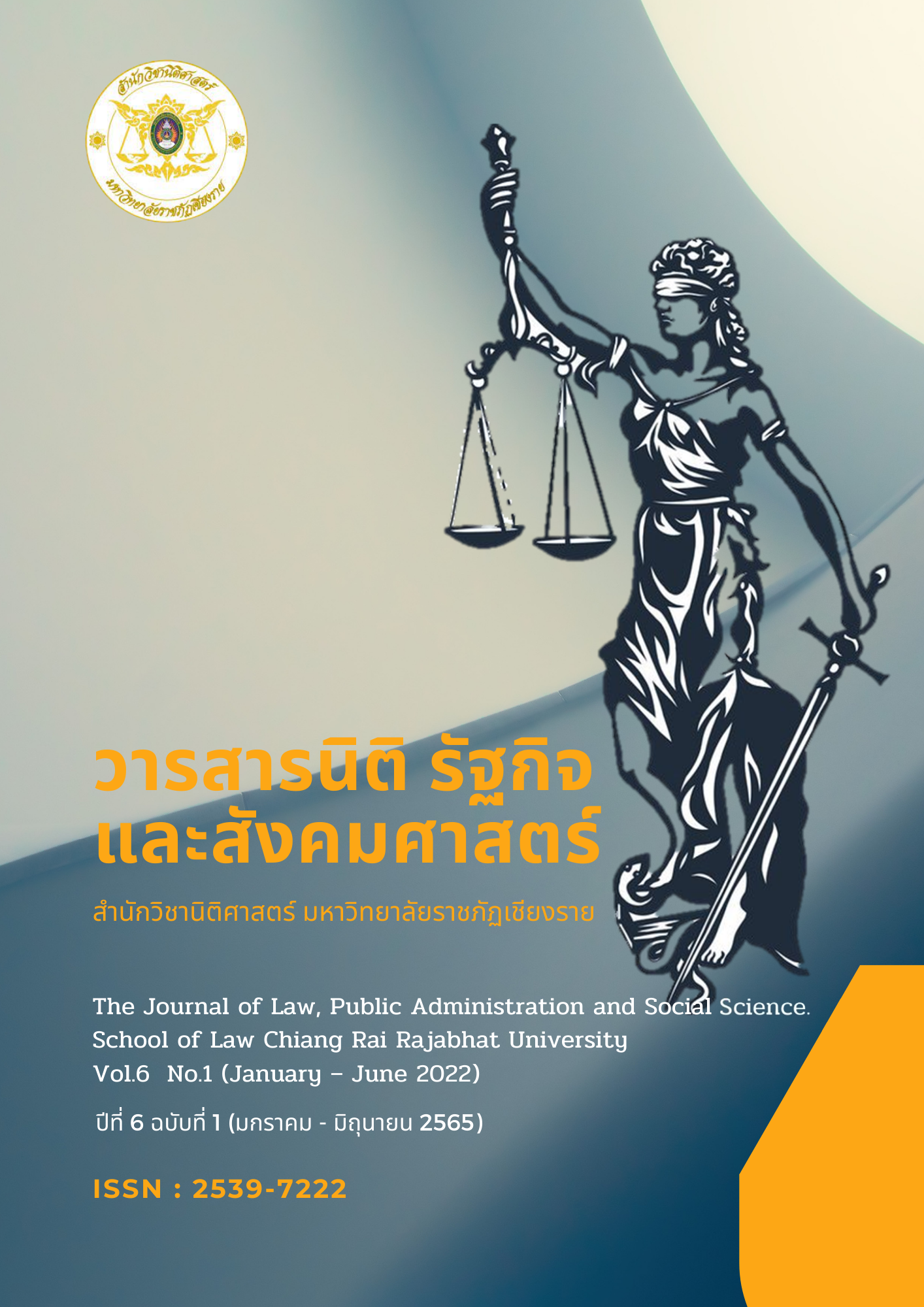การจัดการความสัมพันธ์กองทัพในบริบทการเมืองไทยยุคร่วมสมัย
Main Article Content
บทคัดย่อ
บทความวิชาการนี้ มีวัตถุประสงค์เพื่อศึกษาการจัดการความสัมพันธ์กองทัพภายใต้กรอบแนวคิดการปฏิรูปกองทัพในมุมมองการลิดรอนสิทธิมนุษยชนว่าด้วยการเกณฑ์ทหาร และศึกษาความสัมพันธ์ทางการเมืองระหว่างรัฐบาลกับกองทัพในยุคเปลี่ยนผ่านอำนาจที่ส่งผลกระทบต่อบริบทการเมืองไทยยุคร่วมสมัย ผลการศึกษา พบว่า การจัดการกองทัพสมัยใหม่ของไทย ควรยึดหลักการสร้างกองทัพตามวิถีทางในระบอบประชาธิปไตยทั้งในรูปแบบการบริหารการเมืองและการจัดการกองทัพควบคู่กันไปด้วย ซึ่งโดยหลักการแล้วทหารมีความจำเป็นที่จะต้องอยู่ภายใต้อำนาจควบคุมของรัฐบาลพลเรือนเป็นสำคัญ เนื่องด้วยการบริหารการเมืองสมัยใหม่ในยุคปัจจุบัน หากทหารมีอำนาจเหนือนำรัฐบาลพลเรือน ก็จะส่งผลต่ออิทธิพลของกองทัพที่สามารถครอบงำโครงสร้างเชิงระบบทางการเมือง เพื่อต่อรองผลประโยชน์ทางอำนาจให้กับตนเองและพวกพ้องผ่านระบบอุปถัมภ์ได้
ฉะนั้น การจัดการความสัมพันธ์กองทัพในบริบทการเมืองไทยยุคร่วมสมัย จึงควรมีการปฏิรูปกองทัพในส่วนของระบบความสัมพันธ์เชิงโครงสร้างทั้งระบบ โดยผู้เขียนได้วิเคราะห์และสรุปออกมาได้ 4 แนวทาง ดังนี้
1) การพัฒนาระบบทหารอาชีพและการจัดกำลังพลสำรองใหม่ทั้งระบบ ด้วยการยกเลิกระบบทหารเกณฑ์และปฏิรูปกองทัพตามกรอบแนวคิดการควบคุมเชิงอัตวิสัยและภววิสัย
2) การปฏิรูปการเมืองเชิงระบบว่าด้วยการเสริมสร้างรากฐานความเข้มแข็งทางการเมืองของฝ่ายบริหารกับกองทัพในบทบัญญัติรัฐธรรมนูญอย่างเป็นรูปธรรม
3) การสร้างเสริมระบอบรัฐธรรมนูญนิยมในสถาบันการศึกษาของทหารทุกระดับชั้น เพื่อเป็นการปลูกฝังค่านิยมการพัฒนาการเมืองรูปแบบประชาธิปไตยให้แก่เยาวชนทหารรุ่นใหม่ที่จะก้าวขึ้นมาเป็นผู้นำหรือผู้ปฏิบัติงานของกองทัพในอนาคตต่อไป
4) การเปิดกว้างทางการเมืองแก่ประชาชนในรูปแบบประชาธิปไตยสมัยใหม่ ด้วยการจัดการความสัมพันธ์เชิงระบบโครงสร้างอำนาจในสังคมรูปแบบใหม่ โดยปราศจากการขัดขวางหรือใช้ความรุนแรงของทุกฝ่ายอย่างเป็นประจักษ์ อันได้แก่ กองทัพ รัฐบาล และประชาชน ซึ่งสามารถพบเห็นความสัมพันธ์ลักษณะเช่นว่านี้ ได้โดยทั่วไปในประเทศเสรีประชาธิปไตยที่มีพัฒนาการมาอย่างยาวนาน ทั้งในทวีปยุโรปและอเมริกา
Article Details
เอกสารอ้างอิง
ไทยโพสต์. “ผบ.ทบ. พอใจทหารเกณฑ์ออนไลน์ยอดกว่า 3 พันคน ถือว่าประสบความสำเร็จ.” 2564. https://www.thaipost.net/main/detail/95872. สืบค้นเมื่อ 3 สิงหาคม 2564.
ธนากร สุนทร. “เกาหลีใต้ผ่านกฎหมายใหม่ อนุญาตให้ศิลปิน K-Pop ผ่อนผันการเกณฑ์ทหารได้.” 2563. https://thestandard.co/south-korea-passes-law-allowing-artists-who-receive-government-recognition/. สืบค้นเมื่อ 7 กันยายน 2564.
ธวัชชัย ผลสะอาด. “มาตรการทางกฎหมายเกี่ยวกับการเกณฑ์ทหารและการจัดการกําลังสํารอง.” วารสารวิชาการ มหาวิทยาลัยราชภัฏพระนคร 8, ฉ.2 (2560).
นรพัชร เสาธงทอง. “ประชาธิปไตยแบบไทย.” วารสารวิชาการ มหาวิทยาลัยราชภัฏพระนคร 6, ฉ.2 (2558).
พวงทอง ภวัครพันธุ์. “ปฏิรูปกองทัพ: รื้ออำนาจหลากมิติของกองทัพในสังคมไทย.” 2564. https://www.the101.world/101-policy-forum-military-reform/. สืบค้นเมื่อ 31 สิงหาคม 2564.
พลอย ธรรมาภิรานนท์. “พลเรือนควบคุมทหาร : หนทางสู่ประชาธิปไตยที่มีเสถียรภาพ.” 2560. https://www.the101.world/civilian-control-of-the-military/. สืบค้นเมื่อ 15 มกราคม 2563.
ยุทธศาสตร์ หน่อแก้ว. “การปฏิรูปกองทัพไทย: แนวทางการสร้างระบบทหารอาชีพกับการลดบทบาทของกองทัพภายใต้การควบคุมโดยรัฐบาลพลเรือน.” วารสารบริหารรัฐกิจ 4, ฉ.1 (2563).
รัฐภูมิ ศรีเจริญตา, ยุทธศาสตร์ หน่อแก้ว และปิยมาศ มาวงศ์. “การปฏิรูปกองทัพไทย: มุมมองการลิดรอนสิทธิมนุษยชนตามบทบัญญัติแห่งรัฐธรรมนูญกรณีการเกณฑ์ทหาร.” วารสารนิติ รัฐกิจ และสังคมศาสตร์ สำนักวิชานิติศาสตร์ มหาวิทยาลัยราชภัฏเชียงราย 4, ฉ.2 (2563).
ศิวัช ศรีโภคางกุล และเทอดศักดิ์ ไป่จันทึก. “การเกณฑ์ทหารกับการทรมาน และการละเมิดสิทธิมนุษยชนต่อทหารเกณฑ์ในประเทศไทย: บทวิเคราะห์จากมุมมองหนังสือรัฐศาสตร์ไม่ฆ่า.” วารสารนิติสังคมศาสตร์ มหาวิทยาลัยเชียงใหม่ 10, ฉ.2 (2560).
ศุภณัฐ บุญสด. “การควบคุมทหารโดยพลเรือนในระบบกฎหมายไทย.” วารสารกฎหมายสงขลานครินทร์ 1, ฉ.1 (2561).
สรศักดิ์ งามขจรกุลกิจ และชัญญาพัทธ์ วิพัฒนานันทกุล. “ระบบการเรียนการสอนของโรงเรียนนายร้อยสหรัฐอเมริกากับปรัชญาและ “หัวใจ” ของการผลิตทหารอาชีพ.” วารสารวิชาการมนุษยศาสตร์และสังคมศาสตร์ โรงเรียนนายร้อยพระจุลจอมเกล้า 3, ฉ.1 (2559).
สำนักข่าวช่อง One 31. “‘บิ๊กตู่’ ชี้เกณฑ์ทหารเลื่อนกระทบกำลังพลอาจไม่พอ.” 2563. https://www.one31.net/news/detail/19626. สืบค้นเมื่อ 20 มีนาคม 2563.
หทัยกาญจน์ ตรีสุวรรณ. “19 กันยา 2549 : กว่าทศวรรษของ “รัฐประหารเสียของ”.” 2560. https://www.bbc.com/thai/thailand-41315814. สืบค้นเมื่อ 4 กุมภาพันธ์ 2564.
อรรถพล เมืองมิ่ง และศิวัช ศรีโภคางกุล. “การจัดความสัมพันธ์ระหว่างพลเรือนและทหารที่ผิดพลาดจากรัฐประหารปี 2549 สู่รัฐประหารปี 2557: บทเรียนสู่สังคมไทยเพื่อการปฏิรูปกองทัพ.” วารสารรัฐศาสตร์ปริทรรศน์ มหาวิทยาลัยเกษตรศาสตร์ 4, ฉ.2 (2560).
BBC News Thai. “อภิรัชต์ คงสมพงษ์: ชี้นักธุรกิจการเมือง นักวิชาการฝักใฝ่คอมฯ “คุกคามความมั่นคง”.” 2562. https://www.bbc.com/thai/thailand-50009884. สืบค้นเมื่อ 15 มกราคม 2563.
Croissant, A. & Kuehn, D. “Patterns of Civilian Control of the Military in East Asia's New Democracies.” Journal of East Asian Studies 9, No.2 (2009).
Glenn D. Paige. Nonkilling Global Political Science. United States: Xlibris, 2002.
Huntington, S.P. The Soldier and the State: The Theory and Politics of Civil-Military Relations. London: Harvard University Press, 1957.
Keller, K., Poutvaara, P. & Wagener, A. “Military Draft and Economic Growth in OECD Countries.” Defence and Peace Economics 20, No.5 (2009).
Levi, M. “The Institution of Conscription.” Social Science History 20, No.1 (1996).
Scupham, W. “Friend, fellows, citizens and soldiers: The evolution of French revolution army 1792-1799.” Primary Source 5, No.1 (2014).
Shibata, B. “The Spirit of Civilian Control Over the Military: Lessons from the United States Constitution.” Ritsumeikan law review, (19) (2002-2003).
Trinkunas, H.A. Crafting civilian control of the military in Venezuela: a comparative perspective. Chapel Hill: University of North Carolina Press, 2005.


